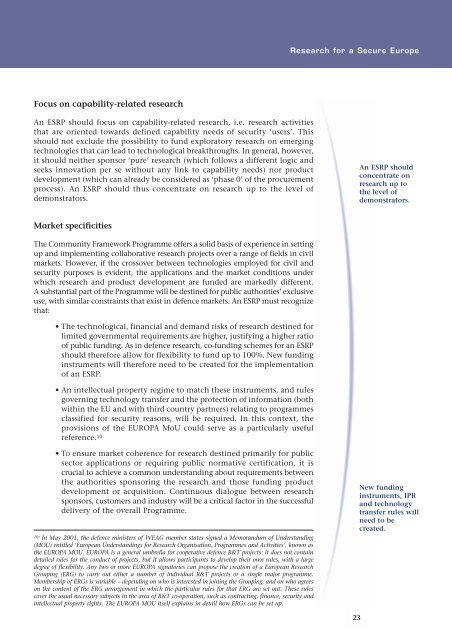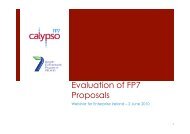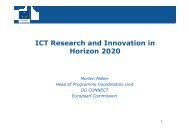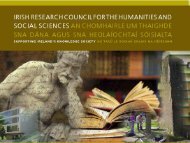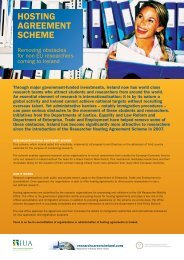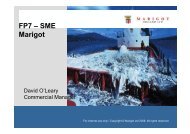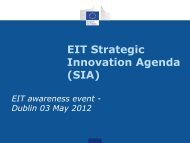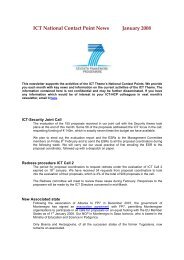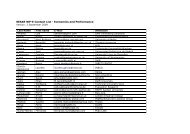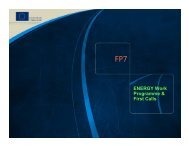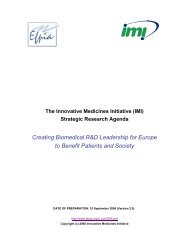Research for a Secure Europe - European Commission - Europa
Research for a Secure Europe - European Commission - Europa
Research for a Secure Europe - European Commission - Europa
You also want an ePaper? Increase the reach of your titles
YUMPU automatically turns print PDFs into web optimized ePapers that Google loves.
<strong>Research</strong> <strong>for</strong> a <strong>Secure</strong> <strong>Europe</strong><br />
Focus on capability-related research<br />
An ESRP should focus on capability-related research, i.e. research activities<br />
that are oriented towards defined capability needs of security ‘users’. This<br />
should not exclude the possibility to fund exploratory research on emerging<br />
technologies that can lead to technological breakthroughs. In general, however,<br />
it should neither sponsor ‘pure’ research (which follows a different logic and<br />
seeks innovation per se without any link to capability needs) nor product<br />
development (which can already be considered as ‘phase 0’ of the procurement<br />
process). An ESRP should thus concentrate on research up to the level of<br />
demonstrators.<br />
An ESRP should<br />
concentrate on<br />
research up to<br />
the level of<br />
demonstrators.<br />
Market specificities<br />
The Community Framework Programme offers a solid basis of experience in setting<br />
up and implementing collaborative research projects over a range of fields in civil<br />
markets. However, if the crossover between technologies employed <strong>for</strong> civil and<br />
security purposes is evident, the applications and the market conditions under<br />
which research and product development are funded are markedly different.<br />
Asubstantial part of the Programme will be destined <strong>for</strong> public authorities’ exclusive<br />
use, with similar constraints that exist in defence markets. An ESRP must recognize<br />
that:<br />
• The technological, financial and demand risks of research destined <strong>for</strong><br />
limited governmental requirements are higher, justifying a higher ratio<br />
of public funding. As in defence research, co-funding schemes <strong>for</strong> an ESRP<br />
should there<strong>for</strong>e allow <strong>for</strong> flexibility to fund up to 100%. New funding<br />
instruments will there<strong>for</strong>e need to be created <strong>for</strong> the implementation<br />
of an ESRP.<br />
• An intellectual property regime to match these instruments, and rules<br />
governing technology transfer and the protection of in<strong>for</strong>mation (both<br />
within the EU and with third country partners) relating to programmes<br />
classified <strong>for</strong> security reasons, will be required. In this context, the<br />
provisions of the EUROPA MoU could serve as a particularly useful<br />
reference. 10<br />
• To ensure market coherence <strong>for</strong> research destined primarily <strong>for</strong> public<br />
sector applications or requiring public normative certification, it is<br />
crucial to achieve a common understanding about requirements between<br />
the authorities sponsoring the research and those funding product<br />
development or acquisition. Continuous dialogue between research<br />
sponsors, customers and industry will be a critical factor in the successful<br />
delivery of the overall Programme.<br />
10) In May 2001, the defence ministers of WEAG member states signed a Memorandum of Understanding<br />
(MOU) entitled ‘<strong>Europe</strong>an Understandings <strong>for</strong> <strong>Research</strong> Organisation, Programmes and Activities’, known as<br />
the EUROPA MOU. EUROPA is a general umbrella <strong>for</strong> cooperative defence R&T projects: it does not contain<br />
detailed rules <strong>for</strong> the conduct of projects, but it allows participants to develop their own rules, with a large<br />
degree of flexibility. Any two or more EUROPA signatories can propose the creation of a <strong>Europe</strong>an <strong>Research</strong><br />
Grouping (ERG) to carry out either a number of individual R&T projects or a single major programme.<br />
Membership of ERGs is variable – depending on who is interested in joining the Grouping, and on who agrees<br />
on the content of the ERG arrangement in which the particular rules <strong>for</strong> that ERG are set out. These rules<br />
cover the usual necessary subjects in the area of R&T co-operation, such as contracting, finance, security and<br />
intellectual property rights. The EUROPA MOU itself explains in detail how ERGs can be set up.<br />
New funding<br />
instruments, IPR<br />
and technology<br />
transfer rules will<br />
need to be<br />
created.<br />
23


